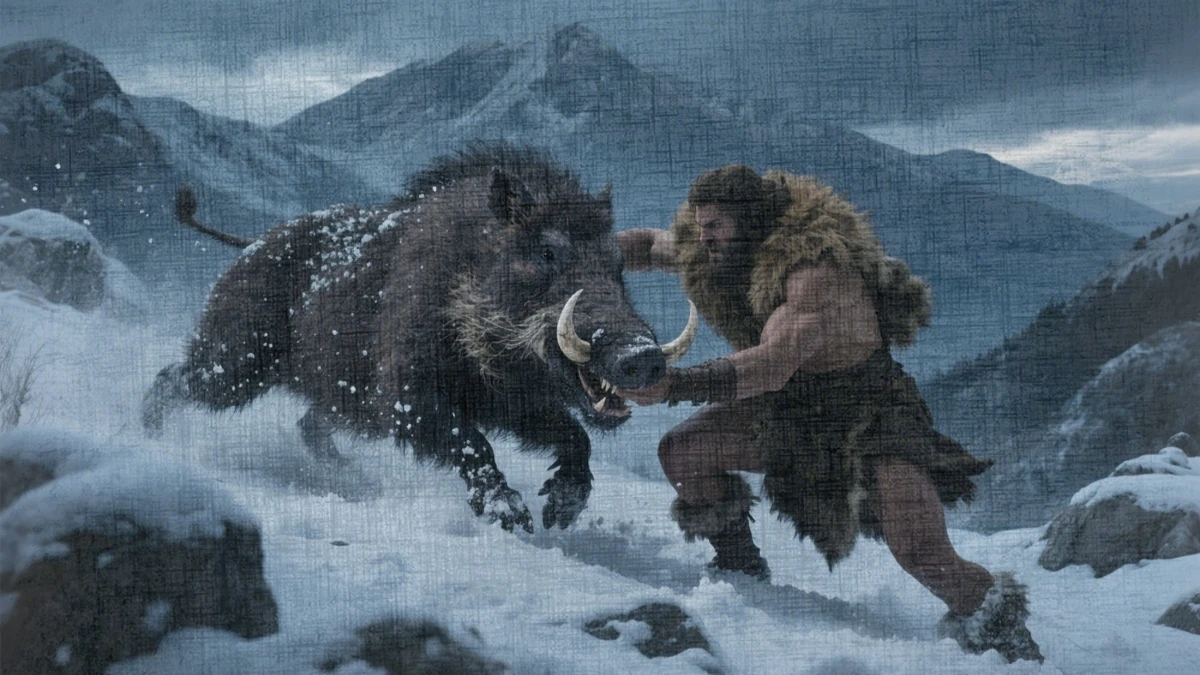Summer and autumn, when fields ripened with grain and vegetables, brought dread to the peasants living near Mount Erymanthus. Each morning revealed fresh devastation—earth upturned, crops trampled, and precious fruit crushed under some brutish force.

The villagers whispered of a monstrous boar dwelling in the oak groves on the mountain slopes. By night, it descended to ravage their fields. Yet none dared hunt the beast, for its tusks and hooves struck terror into every heart.
King Eurystheus commanded Heracles to bring back the Erymanthian Boar alive.
At first, the hero marveled that no skilled archer had slain the creature—surely no great feat for bold hands. Alone, he ascended the rugged slopes of Erymanthus. As he climbed, the thunder of hooves echoed, and a herd of wild horses surged past him into the valley. But a closer look revealed not horses—these were centaurs, their human torsos fused to equine bodies, galloping like tempests made flesh.
“Centaurs!” cried Heracles.
The storm of hooves tore through the mountain pass, straight toward the village below. “This is worse than any boar,” Heracles realized, grasping why Eurystheus had sent him. Undaunted, he pressed on until a young centaur guarding a cave hailed him.
“I am the king’s hunter,” Heracles called amiably. “I seek the boar that plagues these lands. Will you guide me?”
“The beast troubles us as well,” the centaur admitted. “I guard this cave against its ravages. I’ll show you its trail—but first, be my guest.”
He led Heracles inside, lit a fire, and served meat and fruit.
“I’d drink wine with my meal,” remarked Heracles, “but I suppose you have none.”
“None?” The centaur puffed with pride. “Dionysus himself gifted us a cask! I’ll share—but my kin mustn’t know.”
As they drank, the scent of wine drew other centaurs. Enraged at the trespass, they charged the cave. Heracles hurled burning brands from the hearth, scattering them—but outside, the emboldened herd attacked anew. His arrows, tipped with the Hydra’s venom, felled them one by one.
The young centaur emerged, gaping at the corpses. “Can this little stick kill?” He plucked an arrow from a body.
“Beware!” shouted Heracles—too late. The arrow nicked the centaur’s leg, and he dropped dead without a sound.
Heracles buried the fallen beneath a cairn, then tracked the boar through the forest. Wounding its leg, he bound the squealing beast, carried it to Mycenae, and strode into Eurystheus’ palace. The boar’s roars shook the halls. The king, trembling, hid inside a bronze water-vat in the courtyard.
When Heracles found him, Eurystheus peeked over the rim, saw the boar’s snarling snout, and shrieked:
“Away! Take it away!”
Laughing, Heracles departed. The boar was slain, and its meat feasted upon by the people.